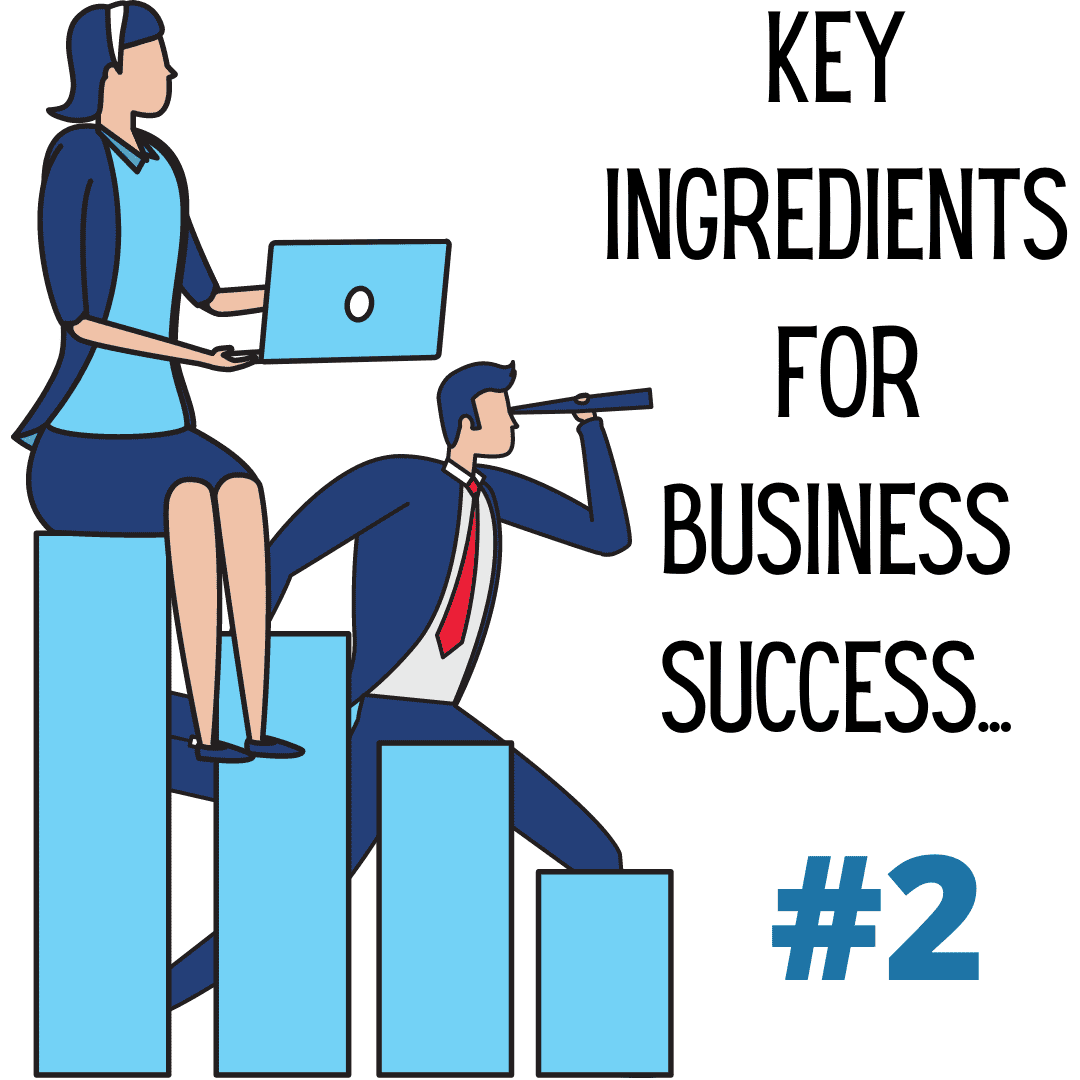The Key Ingredients for Business Success (Part 2)
 There’s
no secret formula that guarantees business success, however, in a series of articles we are examining some of the proven key ingredients.
In part one we identified the importance of careful planning, developing a point of difference and a deep understanding of your numbers. In
part two we look at the importance of having a marketing plan, a thorough understanding of your competitors and developing
systems.
There’s
no secret formula that guarantees business success, however, in a series of articles we are examining some of the proven key ingredients.
In part one we identified the importance of careful planning, developing a point of difference and a deep understanding of your numbers. In
part two we look at the importance of having a marketing plan, a thorough understanding of your competitors and developing
systems.
- Marketing – Doom, Gloom or Boom?
 When
you’re starting your business, you need to wear a lot of hats. Inventor, production manager, receptionist, bookkeeper and cleaner
just to name a few. You also need to fill the role as marketing manager and successful businesses have a clear marketing plan. In the
digital age, your marketing could be the difference between Doom, Gloom and Boom.
When
you’re starting your business, you need to wear a lot of hats. Inventor, production manager, receptionist, bookkeeper and cleaner
just to name a few. You also need to fill the role as marketing manager and successful businesses have a clear marketing plan. In the
digital age, your marketing could be the difference between Doom, Gloom and Boom.
Typically, business owners invest a huge amount of time and money in their new business with research and development, professional advice, a shop, or office fit out, plant and equipment plus lots of inventory to fill the shelves. You might have the best product or service in the industry but without marketing you won’t sell a thing. If you’re expecting a queue of customers and hockey stick growth the moment you open the doors, you’re going to be disappointed. If you think you’ll be inundated with online orders within minutes of your website going live, think again. With websites, it’s not a case of ‘build it and they will come’ because Google can take three or more months to index your website content which means you could be invisible on the internet for months after launching your website.

Don’t underestimate the importance of your brand. It needs to resonate with your target market and your ideal type of customer. Your marketing focus needs to be online because increasingly potential customers start their research online and your website is probably the first touch point with a potential new customer. You need to make a good first impression and an amateurish website (or no website at all) is marketing suicide in the digital age. Your website is your online shopfront and if you want to appear on the first page of a Google search you need original, quality content including text, videos, and images.
In the internet-fuelled world, a great product or service isn’t enough to build a successful business. Your website needs to generate leads, store all your content and be the hub of your marketing activities. You’ll probably find the majority of your competitor’s websites are still just ‘online brochures’ that simply list the who what and where of their business. They treat their website as a cost not an investment, but you need to create a website that is a ‘lead generation machine’ that contains calls to action on every page, lead magnets and videos. It should also have social proof that prove your customers love your products and services.
You need to understand your customers and tailor your content to their needs. Only those businesses that really know their customers deserve their business. You need to know what is important to them which could be price, convenience, location, or same day service. You also need to spell out your expertise and that might mean building content that focuses on your niche markets or specialist services. Don’t forget to heavily promote your business' points of difference.
 If
you haven't already downloaded our e-Book, ‘The 1 Simple Secret to Growing Your Business' you can download it for free from the
marketing page on our website. It documents a 'winning website formula' that will help you build a high performing website. Of course,
if we’re talking about marketing, it’s impossible to ignore social media channels like Facebook, Twitter, YouTube, Instagram, and
others
If
you haven't already downloaded our e-Book, ‘The 1 Simple Secret to Growing Your Business' you can download it for free from the
marketing page on our website. It documents a 'winning website formula' that will help you build a high performing website. Of course,
if we’re talking about marketing, it’s impossible to ignore social media channels like Facebook, Twitter, YouTube, Instagram, and
others
- Systemisation
How is it that some business owners lack the marketing skills of their competitors, seem to work less hours but they are able to scale and grow their business? You’ll find these entrepreneurs have simplified, systemised, and automated large parts of their business so their ‘machine’ runs on auto-pilot.
 The
challenge for every business owner is to create and grow a business that works independent of them. That is, a business that doesn’t rely
on the owner’s technical skill to produce the products and services. The objective should be to create a valuable and saleable asset.
The
challenge for every business owner is to create and grow a business that works independent of them. That is, a business that doesn’t rely
on the owner’s technical skill to produce the products and services. The objective should be to create a valuable and saleable asset.
When Ray Kroc founded McDonalds, he had no intention of working behind a restaurant counter, flipping hamburgers, or cooking fries. His vision was to systemise the business and get hundreds, if not thousands of take away outlets to produce consistent meals and service by getting team members to strictly follow his processes and procedures.
Ray Kroc knew he couldn’t be in 100 stores at once so he developed and documented systems and procedures on how to run the business without his hands on involvement. It included how to fit out stores, hire and train staff, manage the inventory plus heat the buns and cook the fries. Trained staff provide leverage to help grow the business, the profits, and the business value.

Successful business owners work ON the Business, not just IN the business. They don’t waste time on low level tasks that could be delegated to team members or outsourced. This can only happen if you identify every repeatable process or task performed in the business and document how to perform them. You also need to list who is responsible for each step in the process, what tools or resources are to be used and when these tasks should be performed. The mission is to create a business that runs on auto-pilot so management can work on developing and growing the business.
Of course, once you systemise you can then explore ways to automate your processes and technology is the key. One area you can focus on automating is your marketing. Technology can help you grow your list of customers by automatically adding new contacts into your customer relationship manager (CRM) system. Successful businesses recognise their customer database is a key business asset and an up to date, growing customer list is gold. It can make your business more valuable and saleable.
Visitors to your website are encouraged to exchange their contact details for a lead magnet that could be a valuable piece of your content like an e-book, guide, checklist, or free sample. The prospect’s email address is automatically added to your CRM system, and you can then segment your customer database based on their areas of interest. You can then target them with tailored offers and then nurture the relationship by sending regular newsletters and offers.
It sounds simple in theory, however, creating a business ‘machine’ that works like clockwork to produce consistent returns without your daily involvement takes a lot of planning and hard work. A business without systems and automation won’t achieve its full potential.
-
 Understand
Your Competitors
Understand
Your Competitors
Let’s face it, you would love to have your competitor’s best customers in your stable. Don’t worry, the feeling is mutual!
Competition is healthy and exists for a good reason. It provides customers with options and can be the driving force behind product development and improvement. A price war can erupt that forces all players to try and reduce costs and ultimately the consumer wins.
In a crowded market, it’s survival of the fittest, fastest, and smartest. Smart business owners watch their competitor’s moves and eavesdrop on their products, pricing, and marketing. It’s a form of espionage but it’s legal and can give you a competitive edge. Be careful not to become obsessive about stalking your competition because all the research takes time and can soak up resources and energy. You can learn from their marketing strategies, product features and innovation plus you can also learn from their mistakes. Imitation is a form of flattery, but your competitors don’t like copycats. These type of businesses rarely dominate their industry. Success doesn’t happen by chance and your competitors have a proven track record so they must be doing something right.
As a guide, look at your main competitors and:
- Look to cherry-pick the best parts of their product features, systems, processes, and marketing.
- Get to know their pricing
- Monitor their marketing and special offers.
- Understand their point of difference and unique selling point.
- Monitor their social media activities and access their newsletters.
- Read their blogs – do they reveal something about their future plans or products.
Remember, if you get traction in the market your competitors will turn their attention to your marketing and social media accounts. For that reason, when setting up your business make sure you protect your brand and intellectual property with appropriate patents, trademarks, and copyrights. Think carefully about what you post on your social media accounts.

The forensic investigation starts with your competitor’s website that should provide the names of staff and the management team, some history of the business and details of their main products and services. It might provide more information than you expected and give you an insight into their strengths and weaknesses. Are there any obvious weaknesses you could exploit? They will almost certainly have social media accounts so you can explore their Facebook, Instagram, and Twitter accounts plus their LinkedIn profiles. These could uncover a treasure trove of information.
There are lots of tools you can use to ‘spy’ on your competitors and as a guide, Google Alerts will let you monitor every time your competitor is mentioned online and send you an email notification. You can also monitor keywords with this tool.
Summary
Businesses don’t succeed by accident and yours won’t either. To succeed you need a plan that combines strategy with technology and tools. You then need to implement!
Successful business owners monitor their competitors marketing and have their own clear marketing plan. They develop a clear point of difference, systemise their operations, track changes in consumer behaviour and carefully monitor industry trends. They research new and emerging technology that could revolutionise their business.

Smart entrepreneurs recognise the fact that they can’t do it all on their own so they hire the right people and build a team that can grow the business. If you’re looking to build a successful business, we invite you to contact us today. If you’re thinking of starting your own business we have developed a range of templates, tools, and checklists to help you get your business off to a flying start. We have consolidated all these resources into our 32 page ‘New Business Starter Kit’ that you can download from our website.
As always, don't hesitate to contact us if we can assist you with your business.
Read The Key Ingredients for Business Success Part 1
This article forms part of our Business Accelerator Magazine. Download the latest edition HERE or browse other articles from this edition below:
- Government Locks in Director ID Deadline
- ATO’s New Stapled Super Fund Rules – What Do Employers Need to Do?
- Why Do New Businesses Fail?
- Preparing to Sell Your Business
- Return to Top
Disclaimer: This newsletter contains general information only. No responsibility can be accepted for errors, omissions or possible misleading statements. No responsibility can be accepted for any action taken as a result of any information contained in these articles. It is not designed to be a substitute for professional advice and does not take into account your personal circumstances.





 Understand
Your Competitors
Understand
Your Competitors




